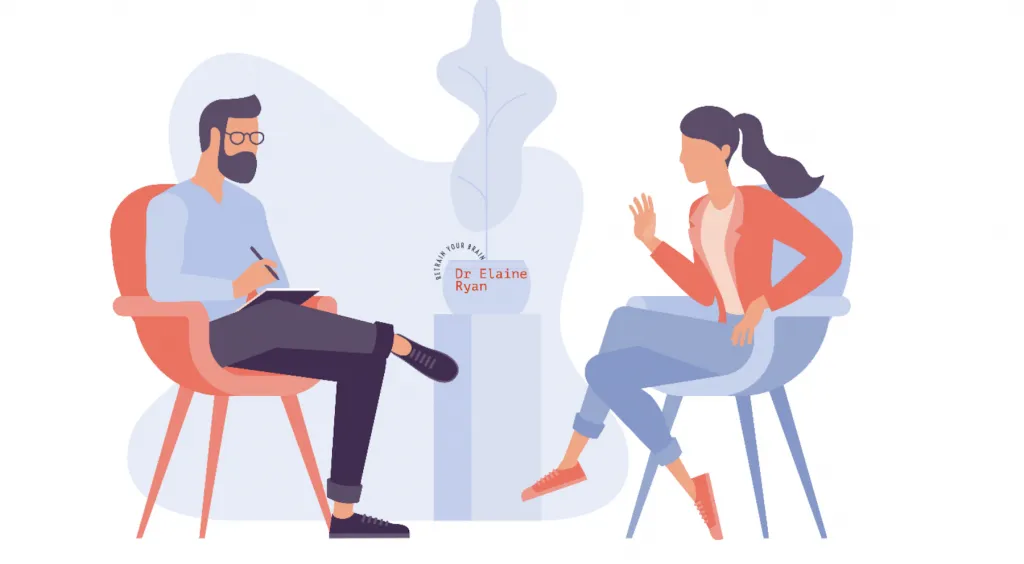Starting CBT can make you feel more anxious, but this does not mean that it is not working; an anxiety spike is not only expected but is a valuable part of the therapy process, allowing you to learn more about and effectively manage your anxiety rather than resorting to coping mechanisms that do not help.
I know that people may drop out of therapy or be reluctant to start due to the initial increase in anxiety that some people experience. I want to dedicate some time today in this article to explain why this happens and why you should not let it put you off therapy, but first, I shall briefly introduce CBT.
What is cognitive behavioural therapy?
Cognitive behavioural therapy (CBT) is an evidence-based talking therapy used to treat many difficulties, including anxiety disorders, which is what this article is about.
If you are working within this model to help you with anxiety, you shall be looking at cognitions – your thoughts process and mental world, as how you think can make you anxious.
You will also be looking at the things you do, such as
- avoiding things that you think will make you anxious
- do you use mental crutches to help, such as bringing water with you in case you panic instead of wanting to stay hydrated?
In looking at your thoughts and behaviours, you will then engage in behavioural experiments to change your thoughts and behaviours to help you reduce the anxiety you experience.

Retrain Your Brain
Online course for anxiety.
Based on Dr Ryan’s private practice
Why would therapy make you anxious?
Starting therapy is anxiety provoking for most people, regardless of whether they have an anxiety disorder.
Meeting with a stranger to discuss something that renders you vulnerable and not knowing what to expect is stressful, but then the stress dissipates.
Why would CBT make you anxious?
The very nature of CBT could go against everything you have been doing so far to manage your anxiety. For example, you might have been hiding it from friends and colleagues and trying to avoid dealing with it.
Once you start therapy, you spotlight it, and more so with CBT, as each time you feel anxious, it is an opportunity to work more deeply within the model.
Let me explain. If you were in session with me or taking my Retrain Your Brain course, each time you feel anxious, I would ask you to complete a specific homework, depending on where we were in therapy or the course.
If we were at the beginning of treatment and looking at your thought processes, you would not be able to avoid your anxious thoughts as this may initially be a little stressful for you, but for many people, it is an enlightening process, so please do not let it put you off.
You can read more about your thoughts and anxiety here.
Feeling more anxious is not a bad thing. I think people who leave therapy or are scared to start due to the possibility of an anxiety spike see this as a bad thing, or are concerned that the treatment is not working or unsuitable for them.
This is not the case. If you cope with your anxiety by avoiding things, I completely understand if you would quit CBT after an anxiety spike, as this is avoidance. This is not me telling you off; it is me attempting to show you that there are behaviours, such as avoidance, that keep you stuck in the anxiety loop, and you must stick with it as it gets much easier.
The behavioural part of CBT may make you feel anxious.
Some of the behavioural experiments you undertake during therapy involve ‘exposure.’
Exposure is where, in a controlled manner, you are exposed to situations that previously caused you anxiety. The rationale is that it is a controlled experiment where you can correct your thought process and calm your nervous system in situ.
It should not be very anxiety-provoking, as you make a hierarchy of things that cause you anxiety, and you start with the least provoking item. So, it is not the therapy that creates the anxiety as the stress would have been there anyway in these situations; it is now you are looking at it differently, with one significant difference; the chance to change.
Do the physical symptoms of anxiety get worse with CBT?
If therapy gives you an anxiety spike, you may feel worse in your body, but this is only temporary and is a learning opportunity.
During therapy, you will be taught how to relax your body. If you have taken my course, you will already be familiar with guided relaxation and meditation.
This is nothing to be afraid of, as look at it like this. The physical symptoms are already there. Starting therapy allows you to work with them and learn how to calm your body at will instead of avoiding aspects of your life due to fear of anxiety.
Outlook
Starting anything new can make you feel stressed, and starting therapy is no different. During CBT, you may feel more anxious, but you will be taught how to deal with this as it occurs and, more importantly, how to manage your anxiety long-term.
